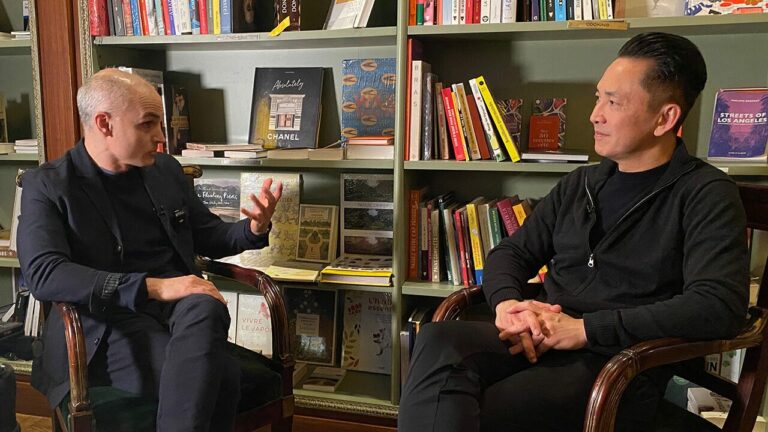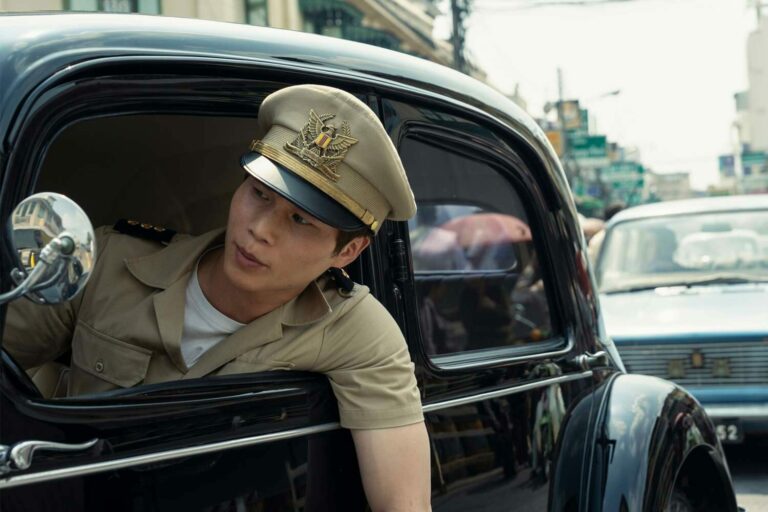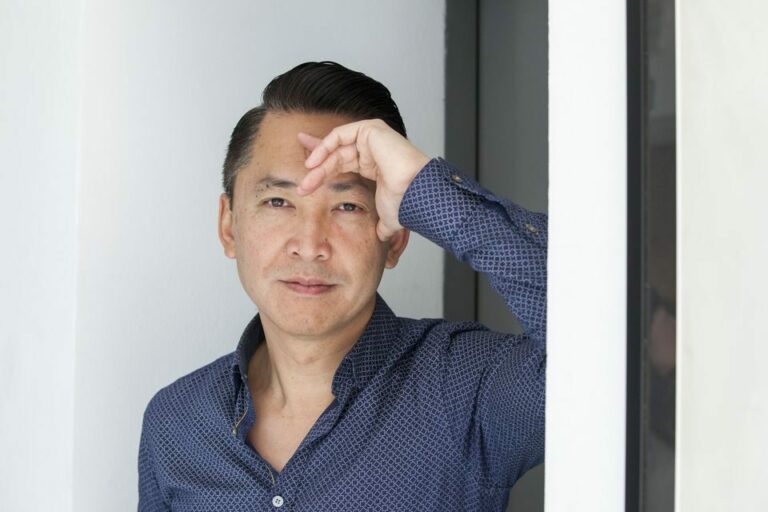Since winning the Pulitzer Prize in 2016, San Jose-reared novelist Viet Thanh Nguyen has become one of the leading voices of the Vietnamese diaspora in the United States. But he didn’t think his own story — about fleeing Vietnam when he was 4 and growing up in Silicon Valley in the 1980s — was compelling enough when it came time to write his memoir. Martha Ross interviews Viet Thanh Nguyen for the San Jose Mercury News

Since winning the Pulitzer Prize in 2016, San Jose-reared novelist Viet Thanh Nguyen has become one of the leading voices of the Vietnamese diaspora in the United States. But he didn’t think his own story — about fleeing Vietnam when he was 4 and growing up in Silicon Valley in the 1980s — was compelling enough when it came time to write his memoir.
So the author broadened the focus of “A Man of Two Faces” (Grove Press, 2023) to encompass the “epic” life of his late mother, Linda Kim Nguyen. She was born in a northern Vietnamese village during French colonial rule, came of age amid an escalating war that ravaged her homeland and scrambled to get her young sons onto a boat during the Fall of Saigon in 1975. Her last decades were spent working “relentlessly” long hours in her family’s SàiGòn Mới grocery store in San Jose’s pre-gentrified downtown.

People in San Jose might have seen her as “the Asian lady with broken English,” but Nguyen said her life is both “ordinary” and “extraordinary” because it resembles those of many other Vietnamese refugees. He believes his mother, born Nguyễn Thị Bãy, deserves a place among the soldier heroes of American narratives about Vietnam and the war.
“People like Má who will not be remembered by History are also a part of History, drafted as reluctant players in horrific wars,” he writes. “Unlike soldiers, these civilians, many of them women and children, never get the recognition they deserve. Some endure more terror, see more horror, than some soldiers.”
To promote “A Man of Two Faces,” the Los Angeles-based author and USC professor returns to San Jose on Monday, Nov. 6. His talk with author Cathy Park Hong takes place in City Hall, which was built across the street from where his parents long ran their grocery store.

The store, Nguyen points out sadly, no longer exists. Under pressure from the city in the early 2000s, Ba Má, as Nguyen collectively refers to his parents, sold the property, and it was torn down and eventually replaced by a luxury high-rise.
In Nguyen’s Pulitzer Prize-winning debut novel, “The Sympathizer,” which has been adapted into an HBO Max miniseries debuting in 2024, he introduced the idea of the “man of two faces.” His protagonist was an American-educated communist informant, working for a South Vietnamese general in the waning days of war.
In his memoir, Nguyen extends that idea to his experience of being a young immigrant straddling two cultures. When he was at home with his parents, he felt he was “an American spying on his Vietnamese parents.” When he left their house, he was a Vietnamese person, “spying on Americans and their strange ways and customs.”
As with much of his writing, Nguyen crafted his sprawling memoir to address historical forces that affect individual choices. His family’s story pierces through discourses about war, imperialism, racial hierarchies and questions about who controls narratives in history.
But Nguyen knows that most readers will be drawn to the “very beautiful and painful story” of his parents, particularly that of his mother. Má died in 2018 after being gravely ill for more than 13 years with what was originally diagnosed as major depression. For most of that time, his father, Joseph Thanh Nguyen, cared for her himself. Telling Má’s story was difficult, Nguyen said, but he realized it was necessary to write about her in order to write about himself.
For one thing, Nguyen doesn’t remember the most dramatic part of the family narrative — their exodus from Vietnam as as communist troops bore down on Saigon. From his older brother Tung, then 10, he gleaned that their mother led them on a long march to a boat where they hoped to meet up with their father and flee to safety. Dead paratroopers hung from trees, and soldiers may have fired on the crowds.
Retracing Má’s life was a challenge because she and her husband never talked much about their experiences before, during and after the war, Nguyen says. For example, they never spoke about being separated from their adopted 16-year-old daughter in the final months of the war, which meant not seeing her again for another 20 years. “Did Má feel guilty for fleeing, for not being with her mother when she died, for leaving her adopted daughter behind?”

Perhaps Nguyen’s parents were stoic by nature, but he said their generation of Vietnamese also frowned upon openly discussing their misfortunes. Therefore, his parents also never talked about the challenges of rebuilding their life in a new country, where a cultural divide inevitably grew between them and their sons. Often left to his own devices, Nguyen devoured comic books, worked at Great America, found his “place in English” when reading books at the library and watched a lot of movies, including Hollywood tales about Vietnam, which tended to depict his people as the enemy.
Nguyen’s book also describes the specter of racism and violence the family encountered in San Jose, including on Christmas Eve when he was 9. His parents were shot in a robbery at their store, but they said little when they were released from the hospital the next day. Nguyen felt strangely detached, writing: “If someone shoots Ba Má in a robbery and they return to work the next day, who are you to feel anything?”
The family’s reticence came into play when he and his parents were victims of a home invasion robbery. At least, Nguyen, then 16, remembered his mother’s “heroism” when she startled the gunman and forced him to flee by screaming and running outside to successfully alert police.
While his parents often seemed indomitable, Má may have been privately suffering from all the losses she endured, though that, too, remains “a mystery,” Nguyen said. He was later reminded that she had been hospitalized for a breakdown when they first arrived in the United States and were living in Pennsylvania.
When Nguyen was a sophomore at UC Berkeley, she had to be hospitalized for another breakdown. Nguyen said this episode occurred a few weeks after his parents discovered one of the secrets he kept in a household of “secrets.” He was dating a Filipina girl, not “a nice Vietnamese Catholic girl.” As a dutiful son, he broke things off and later worried that he caused his mother’s “departure from reality.”
Once again, Má recovered and went back to work. Nguyen later pleased his parents by marrying poet and academic Lan Duong, “a nice Vietnamese Catholic girl,” who also grew up in San Jose after her family fled Vietnam.
Ba Má eventually retired, but she only enjoyed some free time for a couple years. She suffered her final breakdown in 2005 and never recovered. In his memoir, Nguyen movingly recounts saying good bye to her as she died.
“I lean close to tell Má in Vietnamese that I love her,” he writes. “She lived a good life. A life of hard work and sacrifice. A heroic life. A life that demanded so much strength, devotion, and love. .. I remember Má loved me. Everything else I can forget.”
Việt Thanh Nguyễn will be in conversation with author Cathy Park Hong at 6:30 p.m. Nov. 6 in the rotunda at San Jose City Hall, 200 E. Santa Clara Street. Tickets for the event, organized by the Diasporic Artists Networks, are free and available at https://www.eventbrite.com.


